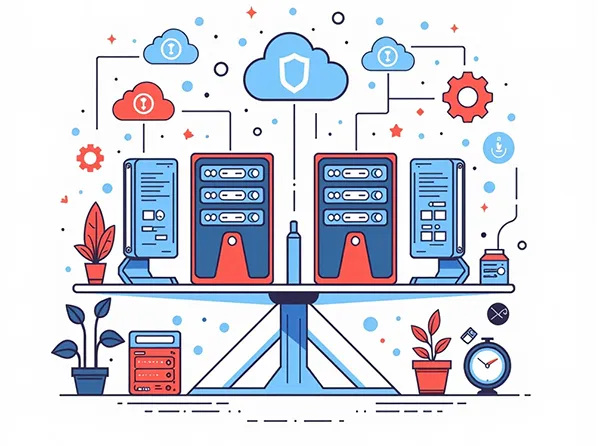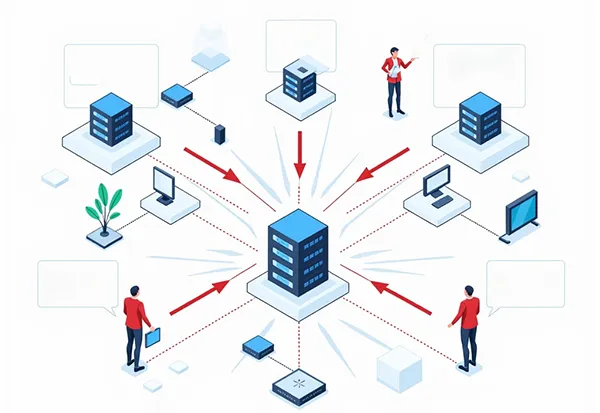Strategic Decision for Modern Businesses
Choosing between Virtual Servers and Dedicated Physical Servers is no longer a purely technical decision for deploying a website or application. It is directly tied to your business growth strategy, data security, resource optimization, and the experience you deliver to your end users.
IT leaders and business decision-makers in the US and UAE face increasing pressure to ensure their infrastructure is secure, flexible, and cost-effective.
On one hand, Virtual Servers attract startups and small teams due to their lower initial costs, high scalability, and fast deployment. This option allows businesses to optimize costs in the early stages and scale resources as demand grows.
On the other hand, Dedicated Physical Servers remain the preferred choice for organizations needing maximum control, enterprise-grade security, and dedicated resources — ideal for high-traffic websites, financial applications, or AI-heavy workloads.
Importantly, these two solutions are not substitutes but answers to different needs. Business leaders must ask:
- Does our growth require fast scalability, or is resource stability more important?
- What level of data security and international compliance is required?
- How does Total Cost of Ownership (TCO) over 3–5 years align with our revenue model?
In this article, we provide a detailed, analytical comparison of these two infrastructure options — not just their technical specs, but the strategic business considerations behind them.
Throughout, we incorporate advanced SEO best practices and UX optimization to ensure this guide is practical, clear, and actionable for CTOs, IT consultants, and even business owners without a technical background.
CTA: Book your free consultation with Rackset today and choose the best server solution for your business.
Key Differences Between Virtual Servers and Dedicated Servers

Definition and Architecture
Virtual Private Servers (VPS) are built on virtualization technology, creating multiple isolated environments on a single physical server.
Hypervisors divide physical resources so each VPS operates independently, with its own OS and isolated environment.
In contrast, Dedicated Physical Servers allocate 100% of hardware resources to a single organization without sharing CPU, RAM, or storage.
This architectural distinction results in significant differences in control, performance, and flexibility.
For projects that require fast deployment, flexible scaling, and simpler management, virtual server hosting is often the right fit.
For organizations needing uncompromised security and peak performance (e.g., financial institutions or sensitive enterprise projects), Dedicated Servers are the premium solution.
Performance and Resources
Dedicated Physical Servers offer reliable, consistent performance because all resources are dedicated to one user or application. Even during peak workloads or demanding compute tasks, performance remains stable — ideal for high-traffic websites, real-time apps, and mission-critical workloads.
In contrast, Virtual Servers share physical resources among multiple VPS instances. This means that under heavy loads, performance may fluctuate. However, scalable VPS hosting allows businesses to instantly scale resources, providing the agility that startups and SMEs value.
Enterprise-grade VPS solutions offer high availability and reliability close to dedicated performance, but for the most sensitive workloads, Dedicated Servers remain the better option.
Cost Comparison and Total Cost of Ownership (TCO)

Cost structure is where VPS and Dedicated Servers differ most.
VPS plans typically follow a pay-as-you-go model, ideal for businesses needing affordable entry points or variable usage. This makes affordable virtual servers the right choice for startups or growing teams.
Dedicated Servers involve higher upfront investment — hardware costs, ongoing maintenance, and management — but can be more economical over time for larger organizations or high-resource applications. For these scenarios, investing in a dedicated server often delivers better value.
Providers like Rackset also offer unmanaged dedicated servers, giving experienced IT teams complete control. Conversely, fully managed servers reduce risk and operational burden for teams without in-house expertise.
CTA: Get a free TCO estimate in minutes!
How to Choose the Right Server for Your Business

Assessing Business Needs and Traffic
Start by evaluating your business’s technical needs and traffic patterns.
E-commerce stores, booking platforms, financial services, and enterprise platforms with high transaction volumes benefit from premium dedicated servers, ensuring performance, security, and compliance.
In contrast, blogs, small business websites, and SaaS startups can leverage fast VPS hosting for a cost-efficient, agile infrastructure that grows with demand.
Key dedicated server benefits include full control, customization, and guaranteed resource isolation for the highest security levels.
CTA: Contact Rackset experts today for a professional needs assessment.
Flexibility and Scalability
In today’s dynamic market, infrastructure flexibility is essential.
VPS hosting allows instant scaling of resources such as CPU, RAM, and storage — ideal for unpredictable traffic spikes like flash sales or promotional events.
Dedicated Servers offer less flexibility but greater stability for predictable workloads.
For businesses needing reliable, consistent infrastructure, Dedicated Servers ensure performance without sharing resources.
Common questions include:
VPS or dedicated hosting — which is better?
Should I choose a VPS for my business?
How to choose a server for a growing project?
These require tailored answers based on your unique needs.
Support and Management
Another critical factor is the support and management level.
Organizations with strong in-house IT teams may opt for unmanaged servers, handling security, updates, and maintenance themselves.
But many businesses in the US and UAE prefer managed services, where Rackset’s team ensures smooth operations, monitoring, and security.
Common research questions include:
What is VPS hosting, and its benefits?
Which server is better for a growing company?
Pros and cons of servers, what exactly differs?
In Rackset’s managed VPS hosting plans, everything from OS updates to security is handled professionally, allowing businesses to focus on growth.
Performance under Load: Real-World Scenarios

Infrastructure performance is often tested in real-world conditions, far beyond what benchmarks can predict. A well-architected environment must ensure stability and responsiveness regardless of fluctuating demand. Dedicated Physical Servers inherently excel in this area. With all resources CPU, RAM, disk I/O — isolated and committed to a single tenant, these servers maintain consistent performance during high-load events, such as peak online shopping seasons or product launches, where user traffic surges unpredictably. Transaction throughput remains stable, page load times stay low, and backend processing keeps pace even under intense pressure.
In contrast, Virtual Private Servers (VPS) share physical resources across multiple virtual machines. Even high-end enterprise VPS hosting platforms can be impacted when several neighboring tenants experience simultaneous spikes in demand. While VPS configurations allow quick scaling of resources, sudden saturation of shared physical infrastructure may introduce latency or degrade application performance.
For businesses handling workloads that fluctuate daily or seasonally, VPS solutions offer agility and cost-efficiency.
But for mission-critical applications where performance predictability is non-negotiable, Dedicated Servers provide peace of mind. Their ability to isolate workloads guarantees minimal jitter, consistent response times, and reliability that’s essential for industries like financial services, e-commerce, and streaming platforms.
The decision hinges on understanding workload profiles. If your business operates time-sensitive or high-value transactions and requires absolute consistency under heavy traffic, Dedicated Servers are the clear choice. Conversely, startups or growing businesses with elastic workloads will find VPS an appealing and pragmatic solution, provided they engage in careful capacity planning and monitoring to mitigate potential resource contention risks.
Security Considerations for Critical Applications

Security and compliance are paramount for businesses managing sensitive or regulated data. Dedicated Physical Servers inherently provide superior isolation since only one organization’s workloads occupy the hardware. This physical separation is a strong security control in itself, eliminating the risks associated with noisy neighbors or vulnerabilities at the hypervisor layer. Industries governed by strict regulatory frameworks — such as healthcare (HIPAA), finance (PCI-DSS), and government contractors (FISMA) — often require physical segregation of environments to meet auditing requirements.
In contrast, Virtual Private Servers rely on hypervisor-based isolation. Modern hypervisors have matured significantly, delivering impressive security guarantees. Many organizations successfully operate compliant workloads on VPS infrastructure. However, the presence of multiple tenants on the same physical machine can introduce theoretical risks that some compliance auditors flag as unacceptable for sensitive workloads.
Beyond baseline architecture, dedicated servers offer businesses complete freedom to customize security controls at a granular level: custom firewall rules, advanced intrusion detection systems (IDS), and encryption strategies tailored to unique operational needs. Secure dedicated servers from Rackset enable organizations to implement rigorous defenses that go well beyond default protections available in shared environments.
Choosing between VPS and Dedicated Servers for security must also account for operational realities: Does the organization have the expertise to configure and maintain complex security controls on a dedicated box? Is there a requirement for complete physical separation to satisfy contracts or certifications? Where these answers point to greater autonomy and strict regulatory adherence, Dedicated Servers are the safer path.
Scalability for Growing Businesses
Scalability is often the deciding factor for fast-growing businesses entering competitive markets. The ability to quickly adapt infrastructure as demands evolve is vital. VPS hosting is inherently more agile in this regard. Within minutes, a business can increase or decrease CPU, memory, or disk allocations without physical intervention. This elasticity empowers startups and mid-sized enterprises to scale incrementally, paying only for the resources they need at any given time.
Imagine a SaaS company seeing steady user adoption: VPS allows them to seamlessly expand capacity to accommodate additional customers or new features, avoiding the delays and capital expenditures associated with hardware procurement and datacenter upgrades. This agility is a major reason why affordable virtual servers are attractive for emerging businesses with dynamic usage patterns.
On the other hand, Dedicated Servers offer raw power and consistency but require more deliberate planning. Scaling a dedicated infrastructure typically involves provisioning additional servers, upgrading components, or even migrating applications to larger machines — tasks that may involve downtime and operational complexity. For businesses with predictable growth and sufficient IT resources, this tradeoff may be acceptable or even desirable.
Moreover, modern orchestration platforms help abstract some complexities in dedicated environments, enabling hybrid scenarios where a baseline Dedicated Server supports critical workloads, while less-sensitive applications leverage elastic VPS resources.
Ultimately, businesses must match their infrastructure strategy to their growth curve: VPS for rapid, granular scaling with minimal overhead; Dedicated Servers for maximum performance and reliability when usage patterns are stable and predictable.
Cost Efficiency: Short-term vs Long-term Analysis
Financial planning is a critical element in choosing an infrastructure strategy. VPS hosting appeals to businesses seeking minimal upfront investment and operational flexibility. Its pay-as-you-go pricing model means you only pay for what you use, making it ideal for startups, SMEs, and projects with fluctuating demand or uncertain scaling trajectories. The ability to right-size environments in near-real-time is a strong financial advantage.
However, over longer time horizons, the economics shift. A business running consistently heavy workloads, with relatively stable traffic and compute requirements, may find that Dedicated Servers become more cost-efficient over 3–5 years. With no hypervisor overhead and guaranteed resource availability, Dedicated Servers eliminate performance bottlenecks that can indirectly drive up operational costs, such as slower page loads or higher support volumes.
In environments with in-house IT expertise, unmanaged dedicated servers offer further savings by allowing businesses to handle maintenance, patching, and monitoring internally, reducing dependency on third-party management services. But this model assumes technical capability and bandwidth exist to manage these tasks effectively.
By contrast, a fully managed VPS or dedicated solution comes at a premium but allows smaller businesses or non-technical teams to outsource complexity, reducing the risk of downtime, security breaches, and misconfigurations.
The right solution depends on workload characteristics and financial goals: VPS is ideal for uncertain or fluctuating workloads where agility matters most, while Dedicated Servers shine for stable, high-utilization environments that can amortize costs over a predictable business horizon.
Management and Support: Which Model Fits Your Team?

Infrastructure choice is as much about operational workflows as it is about hardware or virtualization. Businesses must consider their internal capabilities and decide whether to manage servers themselves or rely on a managed services provider.
Managed VPS hosting is a strong option for businesses lacking dedicated IT staff or wanting to offload day-to-day tasks such as patch management, security updates, performance tuning, and monitoring. Rackset’s managed VPS hosting lets businesses focus on their core operations while experienced professionals ensure infrastructure is secure, optimized, and up-to-date.
For larger organizations or those with skilled IT teams, unmanaged servers — particularly unmanaged dedicated servers — offer greater control, customization, and autonomy. Here, teams assume full responsibility for configuration, security, and maintenance, providing a tailored environment closely aligned to internal standards and workflows.
This choice affects more than just IT workload: it influences agility, scalability, risk posture, and budget planning. A fully managed environment reduces operational complexity but may limit customization. A self-managed environment offers freedom but demands resources, expertise, and constant vigilance.
Ultimately, the management model you choose must align with your team’s capabilities, business priorities, and risk appetite. For many fast-moving businesses, the peace of mind from Rackset’s managed hosting services far outweighs the operational cost.
Hardware-Level Performance and Control Considerations
In addition to traditional dedicated and virtualized environments, businesses with highly demanding workloads sometimes require an infrastructure with maximum control and no virtualization overhead. In such cases, opting for physical machines that provide direct access to hardware resources ensures uncompromised performance and isolation.
These setups are particularly attractive for companies running latency-sensitive applications or workloads where consistent throughput is critical.
While virtualization adds flexibility, the pure hardware approach of bare metal servers delivers the raw performance and dedicated resource allocation that certain industries, such as high-frequency trading or scientific computing, depend on. As businesses evaluate their infrastructure options, considering when a bare metal environment might complement or replace virtualized or dedicated servers can offer significant strategic advantages.
H2: FAQ — Common Questions from US Users
Q1: Is VPS a good option for startups?
A1: Yes. VPS offers flexible, affordable infrastructure ideal for startups needing scalability without large upfront costs.
Q2: Who should choose a Dedicated Server?
A2: Organizations needing maximum performance, enterprise-grade security, and full control benefit most from Dedicated Servers.
Q3: What’s the key difference between Virtual and Dedicated Servers?
A3: The main difference is in resource allocation — Dedicated Servers provide fully isolated hardware, whereas VPS shares physical resources.
Q4: Which option offers better scalability?
A4: VPS is naturally more scalable, allowing businesses to add resources quickly as they grow.

Leave a Reply